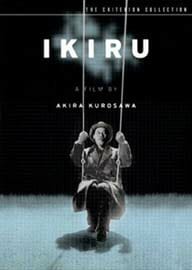
We all will die. We all know it. But it’s the moment of complete mortal awareness that is perhaps mankind’s greatest fear: the instant when we can count the finite sum of our days on Earth. It’s the Big Subject for writers and artists, requiring a deft hand to avoid bromide philosophizing and saccharine sentiment. Ingmar Bergman’s Wild Strawberries (1957) created a universally resonating statement by beautifully portraying one man’s struggle with his numbered days. Five years earlier Akira Kurosawa offered his own masterful rumination on mortality with Ikiru.
In the film, we meet the aging civil servant Kaji Watanabe, who passes his days in numb routine, the value of his life drained by the bureaucracy he serves. When he learns he has stomach cancer, at first he’s consumed by despair, but then is determined to make his remaining time matter.
As in his storytelling tour de force Rashomon, Kurosawa uses an unconventional approach to narrative in Ikiru. The first half of the film concerns Watanabe’s struggle and ultimate acceptance of his death sentence. A second section explores the aftermath of his death, as a group of mourners considers the achievements of Watanabe’s final days in a series of multiple-perspective flashbacks. But rather than reveling in form over substance, the structure enhances the impact of the story, starting with the personal experience and expanding to the communal.
Considering Kurosawa was only 42 at the time he made Ikiru, the dimension and resonance of the film is remarkable. The DVD also includes a pair of biographical documentaries. While the print is not pristine (with contrast problems throughout), the film’s visual beauty still shines through, and its power to affect is undiminished.